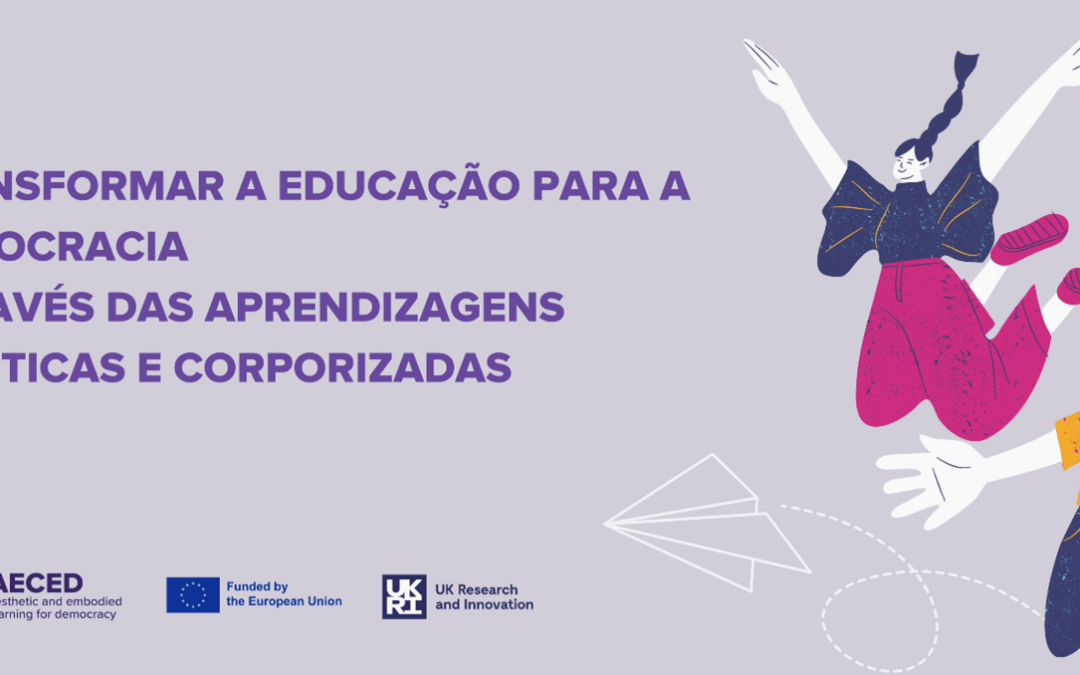Shaping education for democracy through an online course: A Portuguese approach to aesthetic and embodied learning
Recently, we have seen a remarkable shift towards deep and engaging learning experiences in Education. The incorporation of aesthetic and embodied learning approaches in which the body as well as the participant’s feelings and senses are brought into play has resulted in deeper engagement in online courses.
In the AECED Project, the Portuguese team developed an online course in which they brought together two groups of teachers/educators in the early years and primary education phases and two groups from the vocational/adult and professional learning educational phase in order to explore how aesthetic and embodied approaches can be harnessed within the context of education for democracy.
Portugal’s rich history and multicultural education system bring an added dimension to developing practices that embrace aesthetic and embodied learning examples to foster a democratic culture.
Portugal has seen significant developments in education during the past several decades. After the Carnation Revolution in 1974, when the Estado Novo regime fell, Portugal has made notable progress towards more democratic and inclusive education. The commitment to democratic principles within the Portuguese education system today is evidenced in both the curriculum and teaching practices.
Central to this transformation in teaching and learning, have been the concepts of democracy and learner individuality. Portugal’s adoption of constructivist methods and learning-centric policies resonates with aesthetic and embodied learning approaches, which aim to engage and empower the whole learner – emotionally, physically and sensorially.
But how can these practices be modified for use online? The advantages that the flexibility and availability of online courses bring are clear, but there are challenges in replicating the sensory and spatial aspects of in-person learning within an online environment. The AECED case studies from Portugal indicate that these strategies can be incorporated into an online environment via the use of video lectures, interactive assignments and group work.
In addition, the use of multimedia resources such as virtual reality and interactive simulations is common in many Portuguese online courses. These resources invite students to actively participate and connect with their feelings. By placing students within interactive and realistic settings, these courses facilitate the understanding of usually abstract themes.
Key takeaways
In the Portuguese case studies, online education for democracy using integrated aesthetic and embodied approaches was found to be achievable. The students were engaged on all levels–intellectually, emotionally, and physically, which led to transformative learning experiences.
The innovations in education from Portugal can be used as a template for the advancements of participatory and holistic online education frameworks as online education continues to advance. The combination of aesthetic, embodied and democratic principles opens new opportunities in the evolution of education globally.
Adopting these approaches and principles will enable educators to instil a greater appreciation for democratic values amongst learners, cultivating a more empathic generation of global citizens.
Looking into Portugal’s experiences, the AECED project is making great contributions regarding how aesthetic and dynamic learning can be applied across all phases of education through online training courses for teachers and educators. These experiences in Portugal will facilitate the sharing of effective and transformative practices that can be meaningfully adapted for use elsewhere, while remaining grounded in the principles of democracy, inclusiveness, and social and economic justice.
As the AECED project develops further, these Portuguese experiences will undoubtedly remain a source of inspiration and direction for educators worldwide who are seeking to develop more inclusive, democratic, and socially just learning spaces through online training courses.
Blog written by Cláudia Neves, Assistant Professor Portuguese Open University
#Education4Democracy

